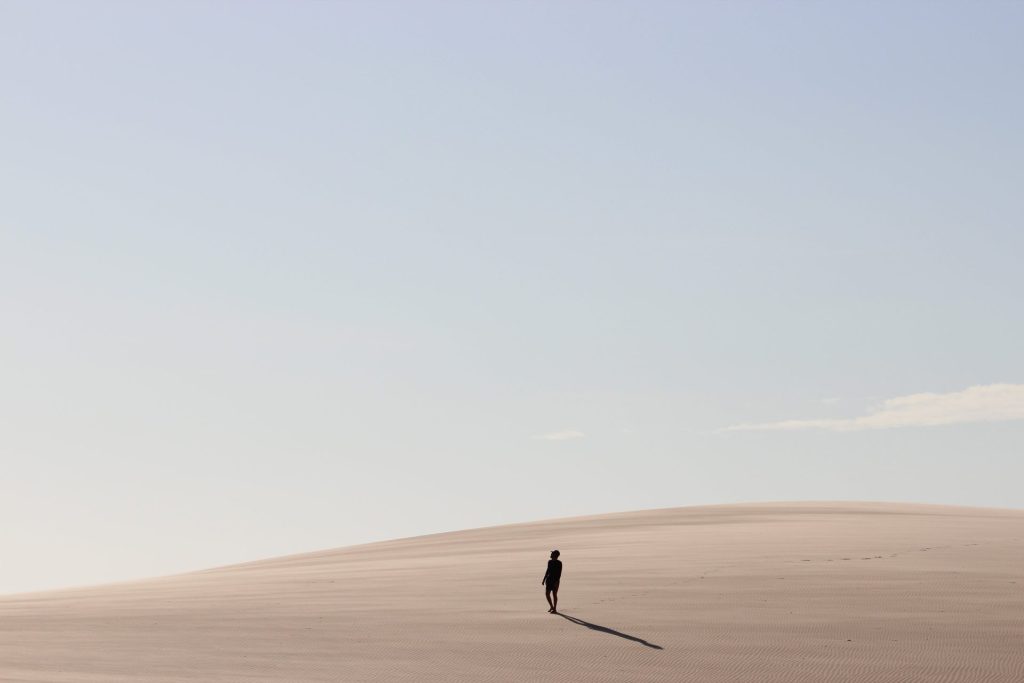
Photo by Rê Oliveira (Pexels)
Sunday, December 10
SECOND SUNDAY OF ADVENT – YEAR B
Mark 1:1-8
The Laudato Si’ Journey continues to accompany the liturgical Sundays. This Sunday, the Gospel presents the figure of John the Baptist, an icon of the person who approaches the God who is born. It is interesting to see how he is the last prophet, a hinge between the Old and New Testament.
How much we need prophetic people and gestures! The entire Jewish culture is imbued with God’s promise of land and descendants, from the time of Abraham. There is no law without the prophets. A prophet is not someone who predicts the future; those are fortune-tellers or charlatans. Rather, the prophet, even today, helps us read the present, understand life around us in the light of God’s word.
This Sunday’s Gospel takes us by the hand to discover this God who, by incarnating, chooses the path of self-emptying. A path of kenosis, a way of subtracting like skilled sculptors who create through acts of subtraction, of humility.
“The beginning of the gospel of Jesus Christ, the Son of God.” These are the first words of the Gospel of Mark. Perhaps it is better to translate the Greek Ἀρχὴ as “principle” because it speaks of what is most important, the element from which all things begin. And, on second thought, this text – perhaps the first in the order of redaction – serves to give us a new “principle,” to fulfill the Scripture, which, with creation, began with the expression “in the beginning.” Here, the narrative of a new creation takes place. To give substance to this narration, Mark uses two quotations.
The first, not from Isaiah but from Malachi, where it says, “Behold, I send my messenger before your face, who will prepare your way” (Malachi 3:1), to purify in the temple our gaze towards God, often in our image and likeness, and to respond to the injustices of the world. The second from Isaiah proclaims: “A voice cries out: ‘In the desert, prepare the way of the Lord,'” words spoken during the exile in Babylon. Two quotations that refer us to thirst, which concerns all humanity, in the face of injustice, the thirst for freedom. The gospel is a story of liberation.
The Gospel of Mark opens with the figure of John the Baptist, represented in the desert baptizing and proclaiming baptism. In the thirst for justice, there is immediately sister water. In the desert of silence and effort, there is a baptism that gives life. A baptism of μετανοίας, the Greek metanoia as conversion, not so much a turning back but an invitation to change life. In the approach to Christmas, we receive the invitation to conversion. And what if this year we lived this invitation even more radically, trying to live integral ecology?
“Repent!” is the urgent announcement of John the Baptist. Change direction, you’re getting everything wrong, it seems he’s telling us. It’s not a pleasant announcement when someone reminds us that we’re getting everything wrong! Think of Pope Francis, his announcement of conversion to integral ecology, how much need there is for conversion! And how difficult it is to make oneself understood, to receive listening. Let’s convert today, as was already said last Sunday; today is the kairos, the opportune moment. We don’t have to wait for future times; just turn our gaze, convert, and the kingdom of God is here.
John the Baptist is an icon of the prophet. He wears “camel’s hair and a leather belt” like Elijah, eats “locusts and wild honey” like a hermit. The camel is the animal that lives in the desert and allows it to be crossed. John the Baptist is clothed in the word of God that quenches in the desert. The locusts in the desert killed the serpent, the word that kills falsehood. In him, the integral strength of the word of God lives, from voice to clothing to food, nourishing and giving life.
People go “from Jerusalem” to him, to be baptized and confess their sins. A reverse exodus, the promised land is no longer Jerusalem, but everyone feels the desire to leave the city. How many times in life do we pursue many “Jerusalems,” only to discover that the encounter with God, in the depths of water and forgiveness, is elsewhere, in creation and in relationships with brothers and sisters! Even if we face a harsh announcement, talking about an axe ready at the root of the trees and a fire that purifies from evil and judges.
Let us pray to the Lord that on this Sunday, He helps us live with prophetic courage, with the words of Saint Clare of Assisi, who said: “Yes, because it is now clear that the soul of the faithful man, which is the most worthy among all creatures, is made greater than the heavens by the grace of God. For, while the heavens with all other created things cannot contain the Creator, the faithful soul alone, because of charity, which the wicked lack, is His dwelling and abode, and this solely on account of charity, of which the impious are devoid. It is the very Truth who affirms this: ‘He who loves Me will be loved by My Father, and I will love him, and We will come to him and make Our abode with him'” (FF 2892).
We sincerely wish you a good Sunday!
¡Laudato Si’!






Thoroughly enjoying this Advent, made all the more special, as I follow this year’s Laudato Si’ Advent Calender, enriched with powerfully motivating, enlightening prayer and reflections, such as this.💜🙏🏾